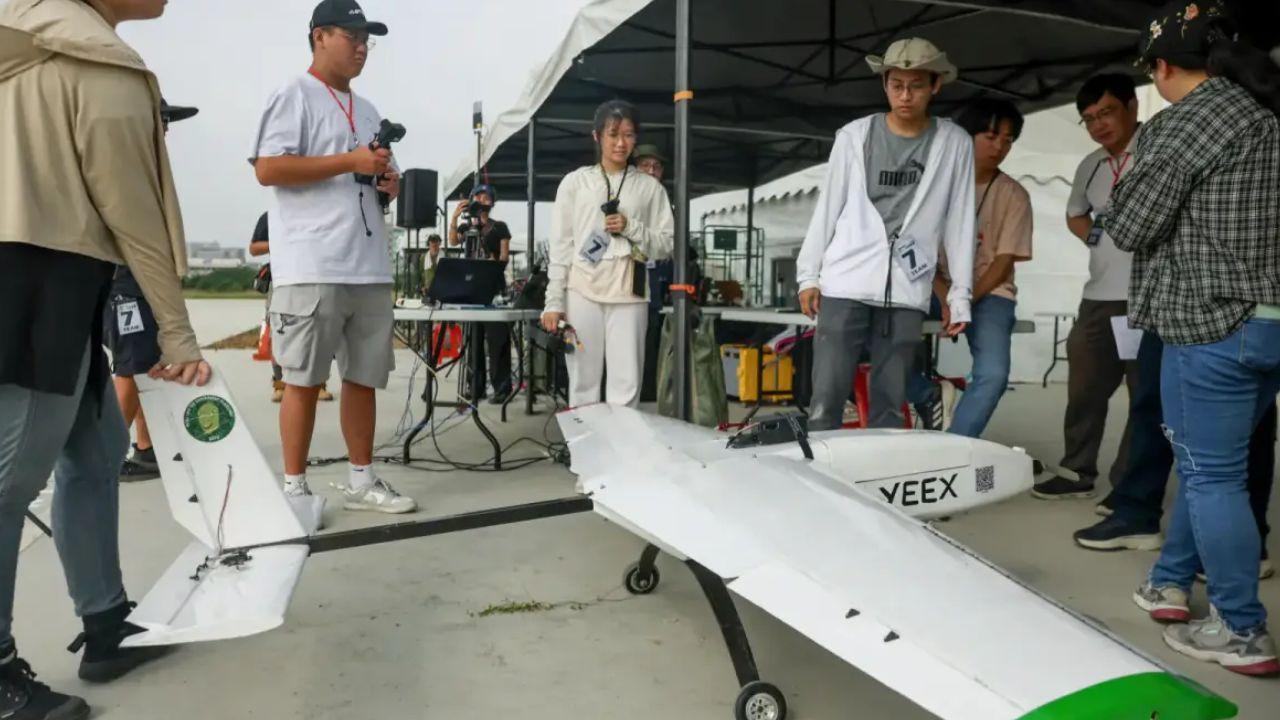
Post by: Pratik Kumar
Photo : AFP
At a drone testing facility in southwestern Taiwan, university students eagerly observe as the unmanned aerial vehicles (UAVs) they designed take flight, occasionally crashing in a simulated battlefield environment. These students are participating in the National Defense Application UAV Challenge, a competition that plays a key role in Taiwan’s efforts to boost its domestic drone production amid rising tensions with China. The island nation has increasingly invested in unmanned aerial vehicles (UAVs) to fortify its defense strategy, creating more agile responses to potential threats from Beijing.
Stay informed with the latest news. Follow DXB News Network on WhatsApp Channel
As China maintains military pressure on Taiwan, Taipei has been ramping up its investments in drone technology. Taiwan's commitment to strengthening its defense capabilities has been underscored by the growing role of UAVs in global conflicts, such as the ongoing war in Ukraine, where drones are used extensively for surveillance and striking deep behind enemy lines. These drones, designed by students during the competition, could eventually be adopted by drone manufacturers and even procured by Taiwan’s government to enhance its military capabilities.
Jan Shau-Shiun, a professor in the space systems engineering department at National Cheng Kung University and the organizer of the competition, emphasized the importance of strengthening Taiwan's drone capabilities. He explained, "We can see drone applications in many current conflicts happening around the world, and Taiwan is in a position where we may also face such an issue. Therefore, we aim to enhance our drone capabilities based on this reality."
The competition, now in its second year, was held over two days last month at the Asia UAV AI Innovation Application R&D Center in Chiayi County. The event attracted 20 teams from across Taiwan, each eager to test their UAVs' capabilities. This year’s competition involved flying multi-rotor and fixed-wing drones autonomously to a height of at least 60 meters, taking images of a remote target, and returning to base within 10 minutes. To increase the difficulty and simulate real-world conditions, the organizers employed jammers to disrupt satellite signals, testing the drones’ ability to stay airborne despite interference. This simulated disruption mirrors the kind of electronic warfare seen in conflicts like Ukraine, where GPS systems are often targeted.
Some drones failed to meet the required height or crashed due to the jamming, while others succeeded in completing the tasks. Cheng Yong-jen, a 24-year-old graduate student from National Formosa University, was relieved when the drone he helped design successfully completed the challenge after several attempts. "It crashed, we repaired it, and it crashed again. When it finally descended safely, I was in tears," Cheng shared, reflecting the emotional toll the competition took after countless hours of designing, building, and testing.
Lin Chun-Liang, the lead judge and professor of electrical engineering at National Chung Hsing University, noted that the competition was crucial for students in developing practical, hands-on skills not typically taught in classrooms. Taiwan is investing hundreds of millions of dollars in drone technology, both to develop its defense capabilities and to foster local talent in the industry. The government’s aim is to make Taiwan an Asian hub for UAV supply chains. However, the growing semiconductor sector, which offers high-paying job opportunities, poses a challenge for the drone industry in retaining talent.
Cheng, who plans to join a drone company after completing his master's thesis on defense drones, acknowledged that Taiwan must continue to invest in the UAV sector despite the challenges. "We cannot stop moving forward just because we are behind others," he said, reinforcing the determination that drives the country's push for innovation in its defense sector.
The competition’s successful completion could lead to practical applications for Taiwan’s military and contribute to further advancements in its national security infrastructure. By promoting both domestic innovation and international collaboration, Taiwan seeks to build a more resilient defense against potential threats from China, strengthening its position as a critical player in the global technological and defense landscapes.
#trending #latest #Taiwan #Drones #UAV #NationalDefense #MilitaryTech #DefenseInnovation #TaiwanDefense #DroneCompetition #TechInnovation #ChinaThreat #NationalSecurity #TaiwanTechnology #UnmannedAerialVehicles #TaiwanTech #GlobalSecurity #headlines #topstories #globalUpdate #dxbnewsnetwork #dxbnews #dxbdnn #dxbnewsnetworkdnn #bestnewschanneldubai #bestnewschannelUAE #bestnewschannelabudhabi #bestnewschannelajman #bestnewschannelofdubai #popularnewschanneldubai

Despite legal concerns, Trump's order keeps TikTok running, and no one is challenging it. Here’s why....Read More.

Fawad Khan makes his Bollywood comeback in Abir Gulaal with Vaani Kapoor. The romantic drama releases on May 9, 2025. Watch the teaser now...Read More.














UAE Wins 16 Medals at Special Olympics World Winter Games 2025
UAE athletes shine at Special Olympics Winter Games 2025, winning 16 medals. A proud moment for incl

Meta’s AI Research Head Joelle Pineau to Step Down in May
Joelle Pineau, Meta’s VP for AI research, will step down in May after 8 years. She led Meta’s open-s

Real Madrid Edge Real Sociedad in 4-4 Thriller to Reach Final
Real Madrid fought back from 4-2 down to draw 4-4 with Real Sociedad sealing a 5-4 aggregate win. Ru

Nottingham Forest Near Champions League After Elanga’s Goal
Anthony Elanga’s stunning solo goal secured Nottingham Forest’s 1-0 win over Man United, pushing the

Ananya Panday Shines at IPL 2025 with Stunning Dance Performance
Bollywood star Ananya Panday dazzled the crowd at Wankhede Stadium with her energetic dance before M